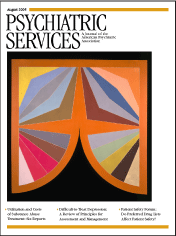An Empowering Medical Model of Mental Health Care
Despite substantial differences between the medical model and empowerment theory, there is no reason that mental health consumers cannot simultaneously seek recovery from illness and powerlessness by using the best of both strategies. Perhaps an individual with mental illness can regain full control over life events only after psychopathology has dissipated, as suggested by the medical model, and perhaps this control promotes illness recovery, as suggested by the empowerment theory, but a combined approach may be most effective.
Public policy can build the capacity of self-help agencies to increase consumers' personal power, and it can increase the agencies' partnership with community mental health organizations to simultaneously alleviate psychopathology. Capacity building requires that self-help agencies receive the funding necessary to allow for universal access to concrete services and support services, thus complementing the medical-model assistance provided by the community mental health centers. A combined treatment approach depends on clear avenues of referral between self-help agencies and mental health centers.
There are natural incentives for collaboration, such as the increased purchasing power and the eventual cost savings from positive treatment and support outcomes. However, to maximize combined service effectiveness, it may be necessary to evaluate and possibly adjust the interagency relationship.
Nevertheless, several challenges will hinder an enhanced collaboration between these two agencies. First, a partnership infrastructure is not currently in place. Second, members of self-help agencies may perceive mental health centers as preserving elitist, professionally centered traditions, and the members of the mental health centers may perceive self-help agencies as lacking direction as they deprofessionalize mental health services in a "blind leading the blind" approach. Finally, mental health centers have typically shown themselves to be resistant to alternative service technologies, and most resource-poor self-help agencies lack the influence necessary to challenge the dominant care system.
Although these challenges can impede effective interagency collaboration, they are precisely the reasons that policy makers should promote enhanced alliance. The approaches of the medical model and empowerment theory both have their own distinct merits and limitations; yet life control and mental health outcomes can be enhanced when both are combined in a more holistic and empowering medical model of mental health care.



